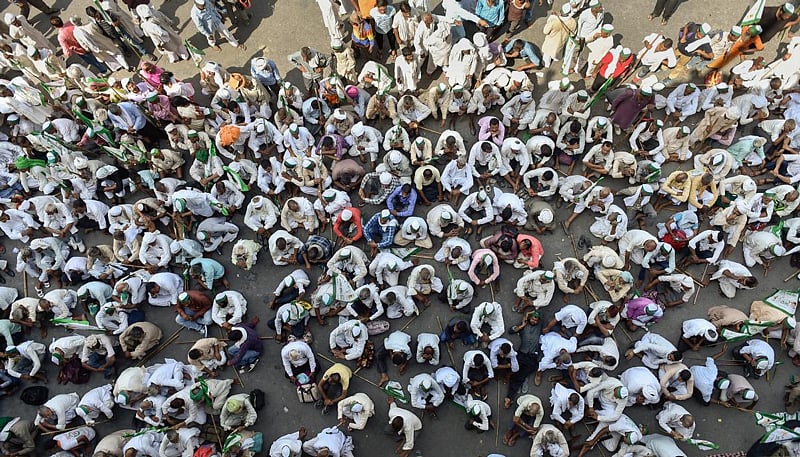
Farmers sit in protest at Delhi-UP border during 'Kisan Kranti Padyatra' in New Delhi.
Credit: PTI File Photo
‘Hasmukh was making a lot of money from farming. He rebuilt his old house. He bought new machines for farming. He used an electric motor to pump water. He bought a motorcycle to go to the city easily and a tractor to plough the field. The tractor could do in a day what the bullocks would take many days to do.’
The paragraph above is from the NCERT textbook for Class-5, but in reality, farmers’ conditions are starkly different. According to recent data from the National Crime Records Bureau’s (NCRB’s) annual report, more than 154 farmers and daily wage labourers kill themselves in India every day. Maharashtra had the highest number of farmer suicides, followed by Karnataka, Andhra Pradesh, Tamil Nadu, and Madhya Pradesh. These figures underscore the turmoil within the agriculture sector, where 11,290 people involved in farming lost their lives last year, comprising 5,207 farmers/cultivators and 6,083 agricultural labourers.
Kurubur Shantakumar, Karnataka State President of Samyukta Kisan Morcha (SKM), a federation of farmer unions, and the Joint Committee of Trade Unions (JCTU) said, “Both the Union and state governments are playing games with farmers who are in a financial crisis following the drought in the state.” SKM held a 72-hour Janateya Maha Dharani in Bengaluru’s Freedom Park on November 26 to protest against the anti-farmer and anti-labour policies of the Centre and state. Among their demands was the removal of the Electricity (Amendment) Bill, 2022, which various farmer unions and power federations across the nation rejected, citing concerns about electricity privatisation and threats to cooperative federalism.
The bill proposes 35 revisions to the Electricity Act of 2003, with Section 5 drawing particular attention. This section allows more than one distribution licensee (or discom) in one region to distribute power to consumers. Although this was referenced in the 2003 Act, the prior legislation required the new discom to have its own cable and distribution infrastructure. The new bill, on the other hand, envisions a system in which the new entrant can use the incumbent discom’s distribution infrastructure in exchange for fees such as wheeling costs. Some, including opposition parties, perceive this as an obvious scheme to increase privatisation in the country.
On November 26, last year, the SKM began a three-day demonstration at the Mohali-Chandigarh border over farmers’ outstanding demands. Other demands include a guarantee for Minimum Support Price (MSP) from the central government, the withdrawal of complaints lodged against farmers during the year-long agitation against the now-repealed agricultural legislation, the waiving of debts, farmer pensions, and so on. They are also requesting that FIRs for burning residue from agriculture be withdrawn, as well as compensation be provided for crop loss caused by floods.
In 2019, Prime Minister Narendra Modi stated that for the Congress, farmers are vote banks, while for the BJP, they are the annadata—providers of food. But the truth is, every political party views farmers as an opportunity to secure votes to win elections and makes promises that are not fulfilled, leading to farmer suicides and agitation. While farmers’ protests are a means of raising concerns, they have consequences. Huge economic losses are recorded after each major protest, and in numerous instances, innocent people have faced major life-threatening problems because of protests.
A more effective approach to resolving farmer issues is to establish regular meetings to address concerns between farmers and the government. In meetings, all the farmers’ problems should be addressed honestly. Farmers must also work with the government. Second, farmers should desist from actions like blocking roads or stopping trains, which inconvenience the public. Such forms of protest jeopardise the life of a patient or a victim of an accident. To avoid harming the State and its residents, it is crucial to find common ground between the government and farmers.
Farmer suicides in India are a complicated issue. The high frequency of debt, lack of government support, unpredictable weather patterns, and an absence of focus on mental health all contribute to worrisome rates of farmer suicide. To address this issue, a comprehensive solution is required, including changes to the financial support system, improved agricultural practices, expanded access to mental health facilities, and policies to provide a sustainable and supportive environment for farmers.
(Fardin Jahangeer is a Research Scholar, and Karamala Areesh Kumar is Head, Dept. of International Relations, Peace and Public Policy, St Joseph’s University, Bengaluru)